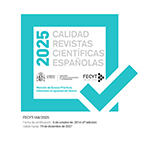Testimonios, discurso experto y comisiones de la verdad: el contexto de la denuncia
Resumen
Este texto analiza las Comisiones de la Verdad como mecanismos políticos desde una doble perspectiva: uno, los testimonios como elemento central que otorga legitimidad ético-política a las comisiones así como por su labor en la determinación de las violaciones de los derechos humanos; y dos, el trabajo de los profesionales del derecho y de las ciencias sociales como expertos que aportan legitimidad científica a estos procesos y que son también testigos privilegiados de la producción de la verdad. A través del estudio de un caso —la Comisión de la Verdad y Reconciliación peruana— se discuten las posibilidades del conocimiento científico para comprender de forma más completa los “hechos de violencia” así como la necesidad de problematizar ciertos presupuestos interpretativos en relación a la agencia política de determinadas poblaciones, en este caso, de las comunidades campesinas andinas.Descargas
Descarga artículo
Licencia
La revista Política y Sociedad, para fomentar el intercambio global del conocimiento, facilita el acceso sin restricciones a sus contenidos desde el momento de su publicación en la presente edición electrónica, y por eso es una revista de acceso abierto. Los originales publicados en esta revista son propiedad de la Universidad Complutense de Madrid y es obligatorio citar su procedencia en cualquier reproducción total o parcial. Todos los contenidos se distribuyen bajo una licencia de uso y distribución Creative Commons Reconocimiento 4.0 (CC BY 4.0). Esta circunstancia ha de hacerse constar expresamente de esta forma cuando sea necesario. Puede consultar la versión informativa y el texto legal de la licencia.











